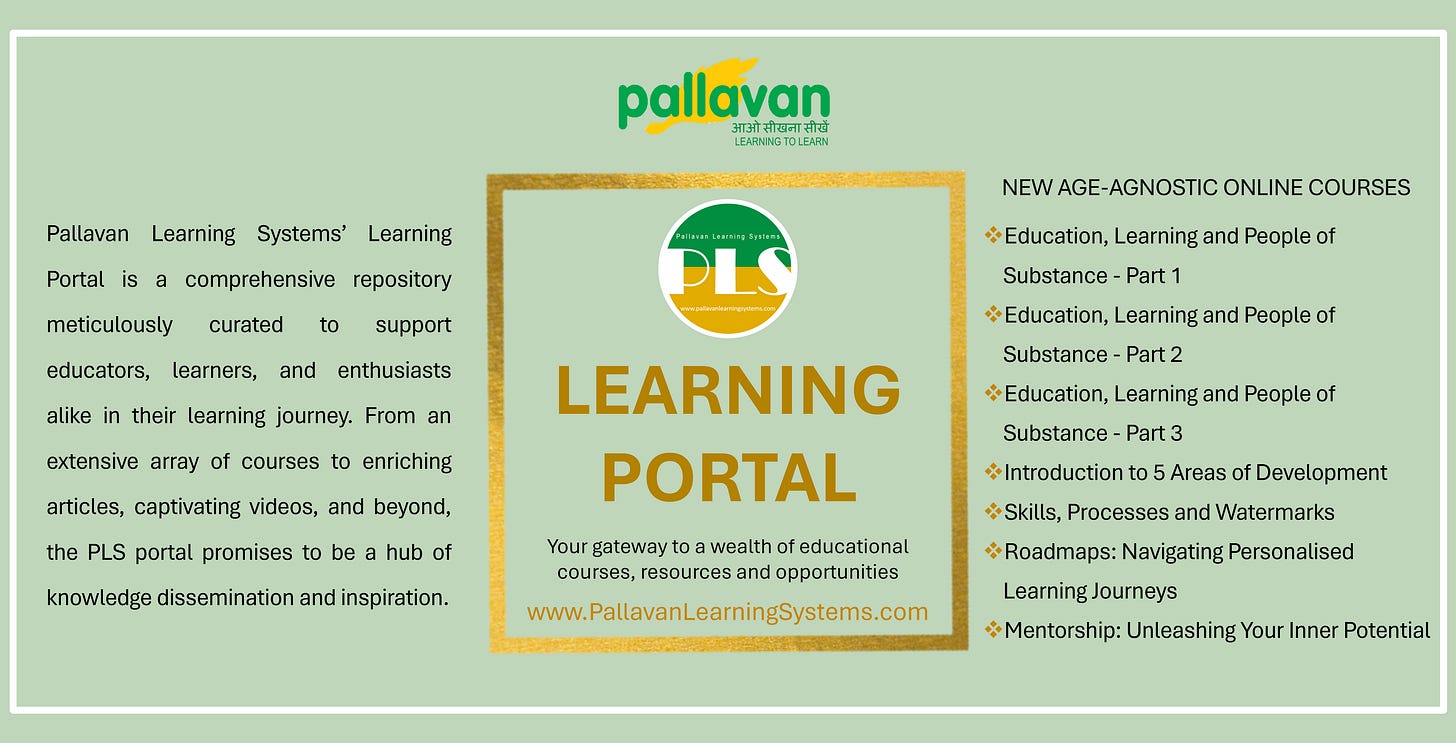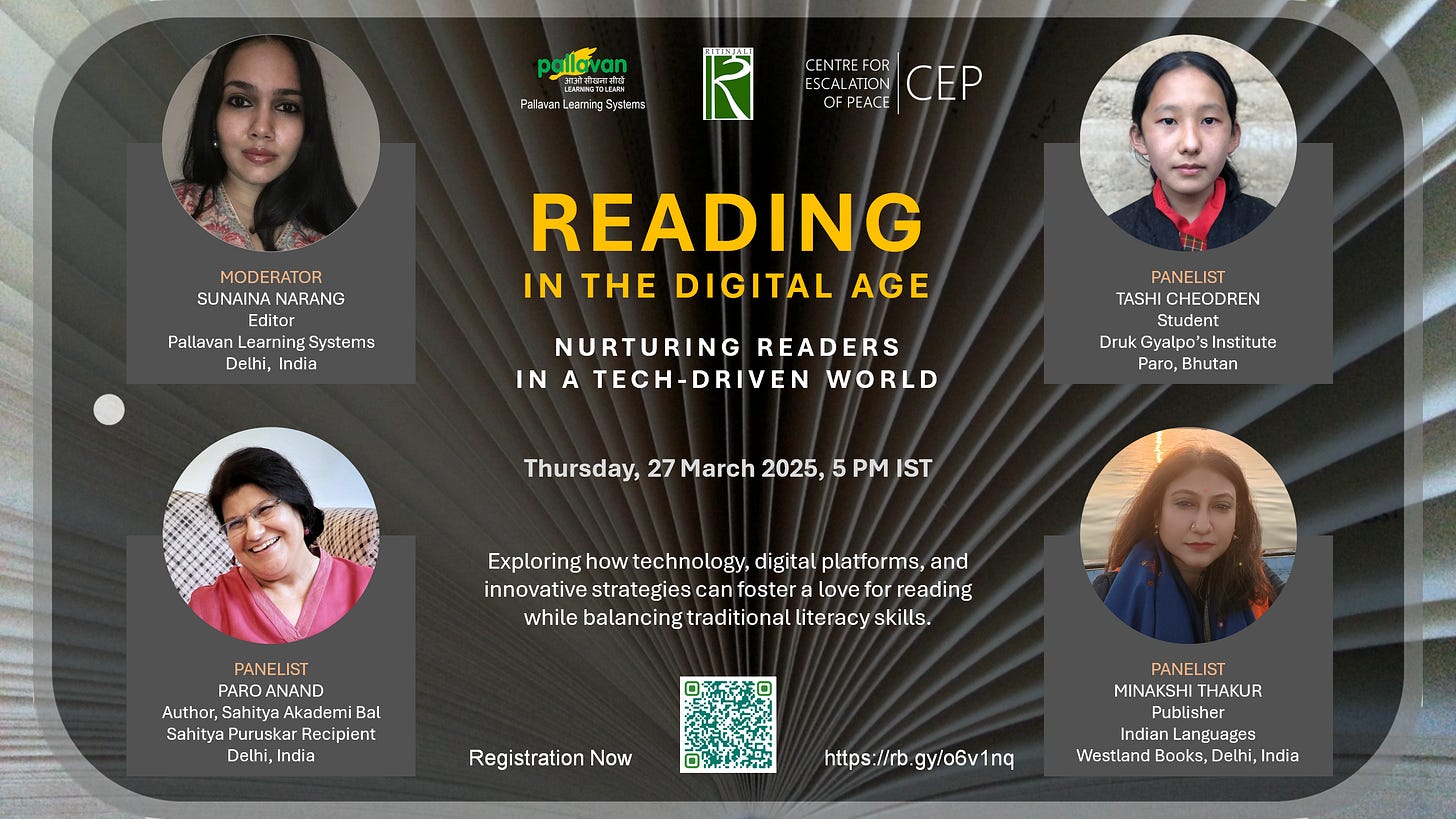March 2025 Issue
We hope this message finds you well. We are reaching out to you since you have been a part of our programmes. It has been a delight to share ideas and insights with you during our events and webinars. If you wish to subscribe to our newsletter and get regular updates, please subscribe to our Substack.
Here is our latest edition for your information.
Editor’s Note:
Dear Reader,
Reading has long been the cornerstone of learning, imagination, and personal growth. Yet, in today’s fast-paced, screen-driven world, igniting a genuine love for books among young readers can be a challenge. As educators and parents, we must embrace creative approaches to ensure that reading remains an enjoyable and enriching experience.
This month, we explore innovative ways to foster a lifelong passion for reading—blending traditional storytelling with modern technology. From interactive storytelling and audiobooks to gamified reading challenges and immersive experiences through augmented and virtual reality, there are now more opportunities than ever to make reading accessible, engaging, and fun.
Personalised book recommendations, digital libraries, and online reading communities also play a crucial role in nurturing young minds. By integrating these tools into learning environments, we can empower students to explore literature in ways that resonate with their unique interests and learning styles.
As we celebrate World Book Day this March, let us reaffirm our commitment to cultivating a love for reading—one that not only enhances literacy skills but also sparks curiosity, critical thinking, and creativity. After all, a child who loves to read becomes an adult who never stops learning.
Happy reading!
Creative Approaches to Spark a Lifelong Love of Reading
by Sunaina Narang
Reading is not merely a skill; it is a fundamental gateway to knowledge, imagination, and critical thinking. The ability to read fluently and with comprehension empowers students to explore new ideas, engage with different cultures, and develop both empathy and independent thought. However, fostering a genuine love for reading is about more than just teaching literacy skills—it requires creating an environment where books are a source of joy, curiosity, and inspiration. In today’s fast-paced, digital-driven world, engaging students in reading has become more challenging, as many children gravitate towards screens and interactive content over traditional books.
As educators, the challenge is to harness the very technology that often competes for students’ attention and use it to enhance reading experiences rather than diminish them. The integration of digital tools into the classroom can make reading more interactive, accessible, and enjoyable. From personalised book recommendations and gamified reading challenges to immersive storytelling through augmented reality (AR) and virtual reality (VR), technology provides teachers with powerful resources to captivate young readers and nurture their lifelong passion for books.
This article explores a variety of creative approaches that teachers can use to foster a love of reading in their students. It highlights the benefits of personalised reading experiences, interactive storytelling, and digital libraries while also examining the role of gamification, online book clubs, and parent involvement. By combining traditional methods with innovative digital solutions, teachers can create a dynamic and engaging reading culture that not only enhances literacy skills but also instills a lifelong appreciation for books and learning.
How Abracadabra Books is encouraging iPad kids to start reading again
by Miska Salemann
Courtesy: New York Post
Abracadabra! The kids are excited to read again.
It may seem like magic, but, the so-called iPad Generation could be ready to turn a new page on the literary crises. Abracadabra Books is among the enthusiastic book companies bringing on the battle — but with science, not spells.
Experts have warned of a literary crisis for years, but concerns appear to be growing for Gen Alpha, and perhaps the newly-crowned Gen Beta could be next.
In 2022, only 33% of fourth graders were reading at grade level, according to National Achievement-Level results. The issue has taken center stage in New York, where as many as eight in 10 kids fail annual reading tests in large districts like Buffalo, Rochester, and Syracuse. In Gotham, less than half pass.
At the same time, screen time use has skyrocketed since 2020, and some research suggests that it has negatively affected preschoolers’ health, academics, and social skills. The American Academy of Pediatrics recommends screen time be limited to an hour a day. Keep reading
Read the room: Addressing technology’s impact on the literacy crisis
by Meredith Knight
Courtesy: The Michigan Daily
The 13-year-olds that I will be teaching when I graduate from the University of Michigan are the same kids who learned how to read over Zoom. During a critical period for catching reading disorders, parents and teachers were thrust into an era of virtual classes and insufficient resources. Learning how to read and use comprehension strategies are important milestones for young children, but many schools are not providing students with the necessary skills to pass them. As a result, literacy rates in the United States are declining — even as they improve globally.
Our increasing reliance on technology in recent decades alongside the consequences of Zoom learning have put the U.S. education system in a difficult position. Keep reading
PLS Learning Portal
Your gateway to a wealth of educational courses, resources and opportunities
For more information about each courses, click here
Sign Up or Login to avail these online courses from May 3, 2024.
Upcoming Events
Webinar: Reading in the Digital Age: Nurturing Readers in a Tech-Driven World
In an era where digital content is reshaping reading habits, how can we foster a love for books while leveraging technology? This webinar brings together experts to explore the evolving landscape of reading—balancing traditional and digital formats, harnessing AI-driven tools, and fostering interactive reading communities. Join us for an engaging discussion on innovative strategies that make reading more accessible, immersive, and meaningful in today’s tech-driven world.
Click here for more information.
Past Events
Webinar: Enabling Environment: Integrating Technology, Inclusion, and Community.
On Thursday, 27th February 2025, Pallavan Learning Systems, in collaboration with Ritinjali and the Centre for Escalation of Peace, hosted a webinar on Enabling Environment: Integrating Technology, Inclusion, and Community. The discussion explored how technology enhances accessibility, engagement, and personalised learning experiences through AI-driven tools, online courses, and assistive technologies.
We are delighted to announce that the webinar report and edited video recordings are now accessible on the PLS Learning Portal. Please click here to access them. You will need to register for the portal if you do not already have an account. You can also download your certificate of participation from the portal.
Philosopher’s Retreat 2024: Navigating Human Connection and Development in the Age of Technology
This year’s retreat explored how technology and digital innovation are reshaping human perception, emotional resilience, and the ability to form meaningful connections. Participants examined the impact of the rapid flow of information on intellect and focus, while addressing the challenge of balancing technological engagement with authentic personal development. The discussions emphasised the importance of preserving essential human qualities—such as empathy, creativity, and critical thinking—in an increasingly digital world. To read the full report Click here.
Services
NIIT, Neemrana
The Serene Strength and Person of Substance course, facilitated by Pallavan Learning Systems, explores the transformative power of education in fostering personal development and nurturing individuals to cultivate serene strength and become constructive and contributory citizens of a just and harmonious society. It implores learners to think about the true purpose of education and learning in our lives, and reflect on our place in the universe. The course also delves into the significance of technology, including present and emerging AI, and encourages a value-driven and future-looking perspective. The course also helps learners to develop an aesthetic mindset that permeates their thoughts and actions, cultivating a sense of beauty and meaning in their lives.
The session held on 7th February delved into actualising potential, cultivating strong leadership qualities, and overcoming mental barriers. Learners explored the importance of learning how to learn, fostering a growth mindset, and prioritising progress over perfection. A key highlight was the discussion on breaking psychological limitations, illustrated through Roger Bannister’s historic 4-minute mile achievement, which served as a powerful reminder of the mind’s ability to redefine possibilities and push beyond perceived boundaries.
The session on February 14th focused on defining the attributes of a Person of Substance, emphasising six fundamental qualities: introspection, a growth mindset, resilience, open-mindedness, strong values, and the ability to inspire. These characteristics were explored in depth, highlighting their significance in personal and professional development.
The February 26th session served as a platform for learners to share their key insights and reflections from the course, highlighting its impact on their learning journey. The objective was to evaluate the depth of their understanding and the course’s effectiveness. Learners were assessed, received constructive feedback, and engaged in discussions to reinforce their growth and application of knowledge.
Ritinjali
On 6th February, a two-hour session was conducted focusing on the Physical Area of Development with the Second Chance School boys. The session covered key components such as fitness, sports, health, and well-being, emphasising the importance of nutrition, exercise, and sleep. Social-emotional and mental health aspects were also emphasised. The session was highly interactive, incorporating various activities and encouraging participants to share their experiences, fostering an engaging and collaborative environment.
On 13th February, a session on the Emotional Area of Development was conducted for the Second Chance School boys. It focused on understanding emotions, recognising them, and responding to them appropriately. It was discussed that the emotional area of development is interconnected with other areas, namely cerebral, social, spiritual, and physical development.
On 20th February PLS conducted a session on the Five Areas of Development, with a focus on the Cerebral Area of Development. The session emphasized Growth and Learning, as well as Skills, Process, and Watermarks. After the presentation, students asked questions on topics such as the need for discipline and the importance of creativity in everyday life.
Pallavan School, Jhalawar
The second session with Dr Dinesh Singh on 8th February explored the integration of technology and AI in education, emphasising tools like GPT-4 and Khan Academy for personalised learning. Discussions covered mathematics history, including the Pythagorean theorem’s Indian origins and the Königsberg Bridge problem as a graph theory introduction. Teachers were encouraged to foster curiosity, refine lesson plans, and leverage AI-driven approaches to enhance student engagement and understanding.
Thanks for reading PLS Newsletter! Subscribe for free to receive new posts and support our work.







